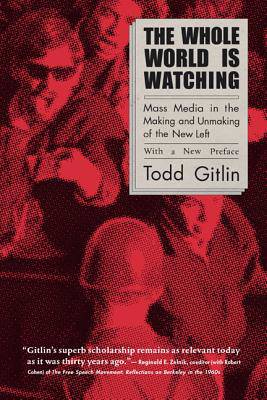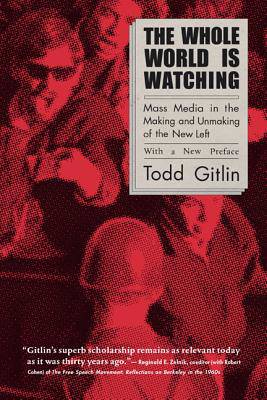
- Afhalen na 1 uur in een winkel met voorraad
- Gratis thuislevering in België vanaf € 30
- Ruim aanbod met 7 miljoen producten
- Afhalen na 1 uur in een winkel met voorraad
- Gratis thuislevering in België vanaf € 30
- Ruim aanbod met 7 miljoen producten
Zoeken
The Whole World Is Watching
Mass Media in the Making and Unmaking of the New Left
Todd Gitlin
Paperback | Engels
€ 59,45
+ 118 punten
Omschrijving
"The whole world is watching!" chanted the demonstrators in the Chicago streets in 1968, as the TV cameras beamed images of police cracking heads into homes everywhere. In this classic book, originally published in 1980, acclaimed media critic Todd Gitlin first scrutinizes major news coverage in the early days of the antiwar movement. Drawing on his own experiences (he was president of the Students for a Democratic Society in 1963-64) and on interviews with key activists and news reporters, he shows in detail how the media first ignore new political developments, then select and emphasize aspects of the story that treat movements as oddities. He then demonstrates how the media glare made leaders into celebrities and estranged them from their movement base; how it inflated the importance of revolutionary rhetoric, destabilizing the movement, then promoted "moderate" alternatives--all the while spreading the antiwar message. Finally, Gitlin draws together a theory of news coverage as a form of anti-democratic social management--which he sees at work also in media treatment of the anti-nuclear and other later movements.
Updated for 2003 with a new preface, The Whole World Is Watching is a subtle and sensitive book, true to the passions and ironic reversals of its subject, and filled with provocative insights that apply to the media's relationship with all activist movements.
Updated for 2003 with a new preface, The Whole World Is Watching is a subtle and sensitive book, true to the passions and ironic reversals of its subject, and filled with provocative insights that apply to the media's relationship with all activist movements.
Specificaties
Betrokkenen
- Auteur(s):
- Uitgeverij:
Inhoud
- Aantal bladzijden:
- 352
- Taal:
- Engels
Eigenschappen
- Productcode (EAN):
- 9780520239326
- Verschijningsdatum:
- 1/05/2003
- Uitvoering:
- Paperback
- Formaat:
- Trade paperback (VS)
- Afmetingen:
- 155 mm x 228 mm
- Gewicht:
- 503 g

Alleen bij Standaard Boekhandel
+ 118 punten op je klantenkaart van Standaard Boekhandel
Beoordelingen
We publiceren alleen reviews die voldoen aan de voorwaarden voor reviews. Bekijk onze voorwaarden voor reviews.











